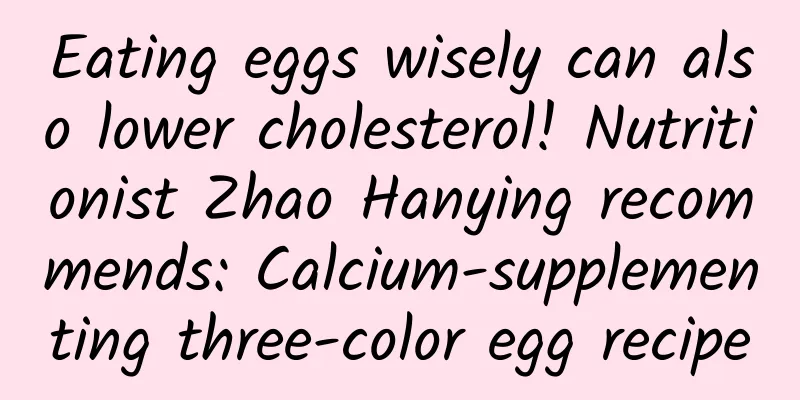What to eat for dysmenorrhea?

|
What can you eat to relieve dysmenorrhea? After dysmenorrhea occurs, you can relieve dysmenorrhea by supplementing foods rich in vitamin E, drinking alcohol appropriately, and adjusting your diet according to the symptoms. How to take care of dysmenorrhea? Let our experts introduce it to you below, hoping to help you! 1. Drink alcohol appropriately: alcohol can warm the meridians, promote qi circulation and dispel cold. Drinking some rice wine, koji wine, fermented rice wine, red wine, etc. appropriately can promote blood circulation, dilate blood vessels and relieve dysmenorrhea. For example, soak 100 grams of safflower in 400 milliliters of liquor for a week to make safflower wine. Take 10 milliliters a day (you can add a small amount of brown sugar), which can warm the meridians and promote blood circulation. It is suitable for people with blood stasis and dysmenorrhea. 2. Supplement foods rich in vitamin E: Vitamin E, also known as tocopherol, plays a role in maintaining the normal function of reproductive organs and muscle metabolism. Foods with high content of vitamin E include grain germ, wheat germ, egg yolk, beans, nuts, leafy vegetables, sesame oil, etc. We should eat more of these foods. 3. Food conditioning according to the symptoms: According to the different symptoms of dysmenorrhea, give foods that warm the meridians, dissipate blood stasis, and replenish the deficiency. People with cold stagnation and qi stagnation, cold body and fear of cold should eat foods that warm the meridians and dissipate cold, such as chestnuts, lychees, brown sugar, ginger, fennel, prickly ash, pepper, etc. Warm reminder: Whether before or after menstruation, we should eat some honey, bananas, celery, sweet potatoes, etc. to keep the bowels open, because constipation can induce dysmenorrhea and increase pain. 4. You can eat more high-protein foods such as beans and fish, and increase green leafy vegetables and fruits. You should also drink more water to keep your bowels open and reduce pelvic congestion. Women should avoid eating salty foods before menstruation. Because salty foods increase the body's salt and water storage. Before menstruation, progesterone increases, which can easily cause edema, headaches, and other symptoms. If you start eating low-salt foods 10 days before menstruation, you won't experience the above symptoms. The above is a brief introduction of dysmenorrhea health care by experts! I believe you have understood it. If you have any questions about dysmenorrhea? Welcome to consult our online experts, we will serve you wholeheartedly! I wish you a speedy recovery! Dysmenorrhea: http://www..com.cn/fuke/tongjing/ |
<<: Care and treatment of irregular menstruation
>>: Does bacterial vaginosis affect pregnancy?
Recommend
Women should beware of cervical erosion causing infertility! Women should avoid eating too much of these six foods to prevent infertility
We all know that the incidence of cervical erosio...
What are uterine fibroids
Uterine fibroids are hormone-dependent tumors, us...
What are the symptoms of chronic pelvic inflammatory disease
Chronic pelvic inflammatory disease is a common g...
Is cervical erosion serious during ovulation?
Is cervical erosion serious during ovulation? Cer...
What are the causes of female cervical erosion? How to treat female cervical erosion?
What is the cause of cervical erosion? Cervical e...
What to do if you have pelvic inflammatory disease and abdominal pain? Take medication according to your doctor's instructions
If pelvic inflammatory disease causes abdominal p...
What are the obvious symptoms of vulvar leukoplakia?
Leukoplakia vulvae, literally speaking, can be un...
What should you pay attention to if you have an ectopic pregnancy?
Ectopic pregnancy is a more dangerous pregnancy s...
How long does it take to expel the abortion pills? What should you pay attention to after medical abortion?
Taking abortion pills will expel the fetal sac in...
Symptoms of postmenopausal uterine fibroids Can uterine fibroids cause uterine bleeding
For some female friends, uterine fibroids are mor...
Can Traditional Chinese Medicine Treat Miscarriage?
It is a misfortune for women to have a miscarriag...
Guizhi Fuling Pills for Ovarian Cysts
Guizhi Fuling Wan is often mentioned as an option...
What are the causes of irregular menstruation in girls?
One of the main characteristics of changing from ...
Blooming Woman Flower 2: Recovery from Painless Abortion
Nowadays, there are relatively many methods for a...
What is cervical erosion? Is cervical erosion a pathological change?
Cervical erosion is not necessarily a disease. Ac...









